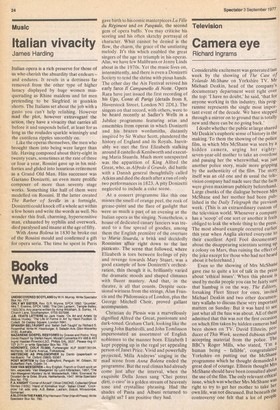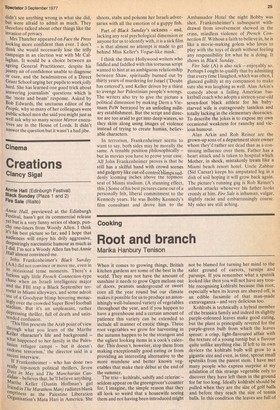Television
Camera eye
Richard Ingrams
Considerable excitement was generated last week by the showing of The Case of Yolande McShane on Yorkshire TV. Mr Michael Deakin, head of the company's documentary department went right over the top: 'I have no doubt,' he said, 'that for anyone working in this industry, this programme represents the single most important event of the decade. We have stepped through a mirror on to ground that is totally new and there can be no going back.' I doubt whether the public at large shared Mr Deakin's euphoric sense of history in the making. To them the showing of the.police film, in which Mrs McShane was seen by a hidden camera, urging her, eightyseven-year-old mother to take an overdose and passing her the wherewithal, was just another police story, made more gripping by the authenticity of the film. The story itself was an old one and as usual the television company had made sure that the facts were given maximum publicity beforehand. Large chunks of the dialogue between Mrs McShane and her mother had been published in the Daily Telegraph the previous week. (This is an extraordinary custom of the television world. Whenever a companY has a 'scoop' of one sort or another it feels obliged to leak the whole thing to the press. The most absurd example occurred earlier this year when Anglia alerted everyone to their excellent April Fool documentary about the disappearing scientists setting up a colony on Mars, thus ruining the effect of the joke except for those who had not heard about it beforehand.) Even so the showing of Mrs McShane gave rise to quite a lot of talk in the press about 'ethical issues'. When this phrase is used by media people you can be fairly sure that humbug is on the way. The Editors, forsaking Fleet Street for once, invited Michael Deakin and two other documentary wallahs to discuss these very important matters on Sunday. But it was hard to seer just what all the fuss was about. All of them admitted that this was not the first occasion on which film taken by hidden cameras had been shown on TV. David Ellstein, preducer of This Week, seemed dubious about accepting material, from the police. The BBC's Roger Mills, who stated, `1'm 3 human being — fallible', congratulated Yorkshire on putting out the McShane programme which he thought demanded a great deal of courage. Ellstein thought Mrs McShane should have been consulted about the use of the film. The only relevant ethical issue, which was whether Mrs McShane was right to try to get her mother to take her own life, was not discussed. But beneath the controversy one felt that a lot of peoPle didn't see anything wrong in what she did, but were afraid to admit as much. They therefore talked about other things like the invasion of privacy.
Mrs Thatcher appeared on Face the Press looking more confident than ever. I don't think she would necessarily lose the telly campaign in an election war with Mr Callaghan. It would be a choice between an ageing General Practitioner, despite his Jaunty air of confidence unable to diagnose or cure, and the headmistress of a Direct Grant School urging her pupils to work jolly hard. She has learned one good trick about answering journalists' questions which is the 'mote and beam' response. Asked by Bob Edwards, the unctuous editor of the People, why so many of her colleagues were Public school men she said you might just as Well ask why so many senior Mirror executives are in the House of Lords. It didn't answer the question but it wasn't a bad jibe. shoots, stabs and poisons her Israeli adversaries with all the emotion of a guppy fish.
Part of Black Sunday's sickness — and, lacking any real psychological dimension or anyone for us to identify with, it is a sick film — is that almost no attempt is made to get behind Miss Keller's Vogue-like mask.
I think the three Hollywood writers who fiddled and faddled with this tortuous script wanted to hint at an ambiguous relationship between Shaw, spiritually burned out by thirty years of murdering for Israel ('Doubt has entered'), and Keller driven by a thirst to avenge her Palestinian people's wrongs. The writers also try to give the picture a political dimension by making Dern a Vietnam PoW betrayed by an unfeeling military establishment. But the script and director are too araid to get into deep waters, so they skim along using images of violence instead of trying to create human, believable characters.
In terrorism, Frankenheimer seems to want to say, both sides may be morally the same. A tenable position philosophically — but in movies you have to prove your case. All John Frankenheimer proves is that he still has a skilful hand with crowd scenes and gadgetry like out-Of-contrabiimps suddenly looming inches above the topmost seat of Miami stadium, (A stunning effect, this.) Some of his best pictures came out of a personally felt, liberal commitment to the Kennedy years. He was Bobby Kennedy's film consultant and drove him to the Ambassador Hotel the night Bobby was shot. Frankenheimer's subsequent withdrawal from involvement showed in the crass, mindless violence of French Connection II. Without a faith to believe in, he is like a movie-making golem who loves to play with the toys of death without feeling any responsibility for what he is doing. It shows in Black Sunday.
Fire Sale (A) is also sick — enjoyably so. Perhaps I ought to qualify that by admitting that every time I laughed, which was often, I glanced guiltily at my companion to make sure she was laughing as well, Alan Arkin's comedy about a failing American basketball coach who adopts a sixteen-year-old seven-foot black athlete for his baby starved wife is outrageously tasteless and totally lacking in the elementary decencies. To describe the jokes is to expose my own occasional weakness for raunchy and vicious humour.
Alan Arkin and Rob Reiner are the grown-up sons of a department store owner whom they'd rather see dead than as a continuing influence over them. Father has a heart attack and is taken to hospital which Mother, in shock, mistakenly treats like a Miami beach resort hotel. Uncle Zabbar (Sid Caesar) keeps his amputated leg in a dish of soil hoping it will grow back again. The picture's running gag is Rob Reiner's asthma attacks whenever his father looks crossly at him. Fire Sale is inhuman, vulgar, slightly racist and embarrassingly coarse. My sides are still aching.































 Previous page
Previous page